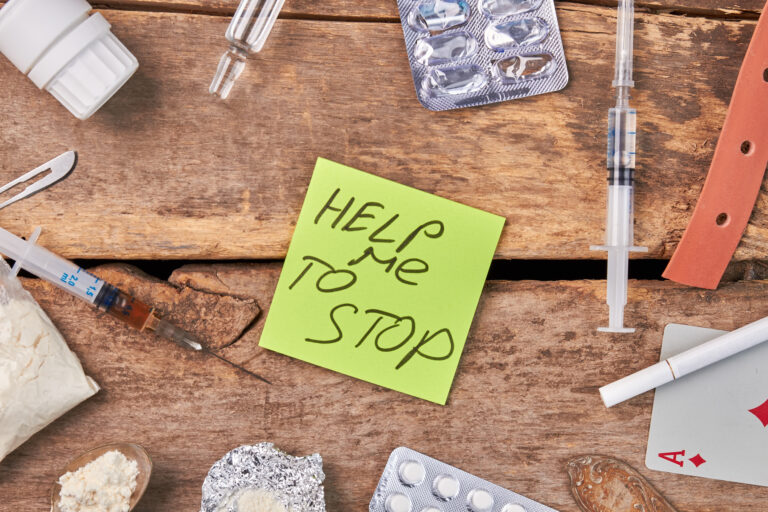Addiction is not merely a result of drug misuse. It is a complex dance of genetics, environment, mental health, and the pharmacological properties of the substance. While every person’s journey with addiction is unique, certain drugs are universally recognized for their high addictive potential. Not all drugs are equally addictive and not everyone who uses highly addictive drugs become addicted, some substances have a particularly strong hold on individuals, leading to severe physical, psychological, and social consequences. This comprehensive look at the most addictive drugs will consider their effects, reasons for addiction, and the impact they can have on users.
1. Heroin
Heroin is one of the most potent and addictive opioids. It’s derived from morphine and delivers an intense euphoric rush upon use.
Effects:
Induces sensations of warmth, well-being, and relaxation.
Addiction Reason:
It’s an opioid, which means it enters the brain rapidly and binds to opioid receptors, amplifying feelings of pleasure.
Impact:
Severe withdrawal symptoms, risk of overdose, collapsed veins, and infectious diseases.
2. Cocaine & Crack Cocaine
Cocaine is another highly addictive stimulant, often referred to as “coke” or “crack” in its freebase form (more potent). The intense high and subsequent crash can create a cycle of dependency, causing users to seek the drug repeatedly.
Effects:
Intense euphoria, energy, increased alertness.
Addiction Reason:
Cocaine interferes with the reabsorption of dopamine, leading to heightened pleasure sensations.
Impact:
Heart palpitations, respiratory failure, neurological effects, and potential for overdose.
3. Methamphetamine (Meth)
Methamphetamine, commonly known as meth, is a powerful stimulant that can lead to addiction after just a few uses. Its effects on the brain’s reward system make quitting extremely challenging.
Effects:
Increased energy, pleasure, and enhanced self-esteem.
Addiction Reason:
Meth significantly increases dopamine release and blocks its reabsorption.
Impact:
Weight loss, dental issues, and high potential for overdose.
4. Nicotine
Nicotine is the addictive substance found in tobacco products, such as cigarettes and e-cigarettes. Smoking is a leading cause of preventable deaths worldwide, primarily due to its association with various cancers and respiratory diseases.
Effects:
Relaxation and heightened alertness.
Addiction Reason:
Nicotine stimulates the release of dopamine, enhancing reward sensations.
Impact:
Heart disease, lung cancer, and respiratory issues.
5. Alcohol
Alcohol is legal and widely consumed, but it’s also highly addictive. Excessive and prolonged alcohol use can lead to alcoholism, a condition with severe health and social consequences.
Effects:
Euphoria, lowered inhibitions, and increased sociability.
Addiction Reason:
Alcohol enhances the effects of the neurotransmitter GABA, leading to feelings of relaxation.
Impact:
Liver damage, heart disease, and withdrawal symptoms which can be fatal.
6. Benzodiazepines (like Valium, Xanax)
Effects:
Reduced anxiety, sedation, and muscle relaxation.
Addiction Reason:
They enhance GABA’s effects, leading to sedation and anxiolytic effects.
Impact:
Cognitive impairment, dependence, and severe withdrawal symptoms.
7. Prescription Opioids (like Oxycodone, Fentanyl)
Effects:
Pain relief, relaxation, and euphoria.
Addiction Reason:
They bind to opioid receptors in the brain, inducing relaxation and reducing pain.
Impact:
Respiratory depression, addiction, and high overdose potential.
8. Barbiturates
Effects:
Creates feelings of relaxation and sedation.
Addiction Reason:
They reduce the activity of the central nervous system.
Impact:
Cognitive impairments, dependence, and high risk of overdose.
9. MDMA (Ecstasy)
Effects:
Heightened sensations, increased empathy, and euphoria.
Addiction Reason:
Boosts serotonin, dopamine, and norepinephrine levels.
Impact:
Dehydration, hyperthermia, and potential for serotonin syndrome.
10. Bath Salts (Synthetic Cathinones)
Effects:
Enhanced alertness, pleasure, and energy.
Addiction Reason:
They’re stimulants that can increase dopamine, norepinephrine, and serotonin.
Impact:
Hallucinations, paranoia, and aggressive behavior.
FAQs
Q: Why are certain drugs more addictive?
A: Certain drugs are more addictive because of the intense euphoria, rapid alteration of brain chemistry, withdrawal symptoms and psychological dependence.
Q: How does genetics influence addiction?
A: Genetics alone do not determine addiction. Genetic factors influence the brain’s response to drugs and can increase one’s susceptibility to environmental factors that promote addiction.
Q: Are prescription drugs less addictive?
A: Not necessarily. Many prescription drugs, especially opioids & benzos, if misused can be just as addictive as illicit drugs. Prescription drugs should only be used as prescribed to minimize the risk of addiction.
Conclusion and Seeking Help
Understanding the nature and potential for addiction is the first step towards prevention and recovery.
If you or someone you know struggles with addiction, there are resources available that can help. The Farm Rehab in Stouffville, Ontario, Canada is committed to aiding individuals on their journey towards recovery. With comprehensive addiction treatment programs, The Farm Rehab provide the necessary support to overcome addiction’s challenges. Get in touch with us today to request a confidential consultation.





